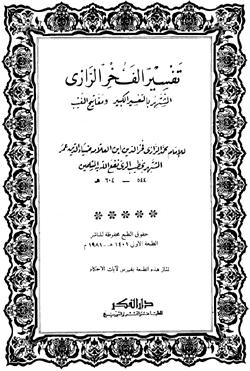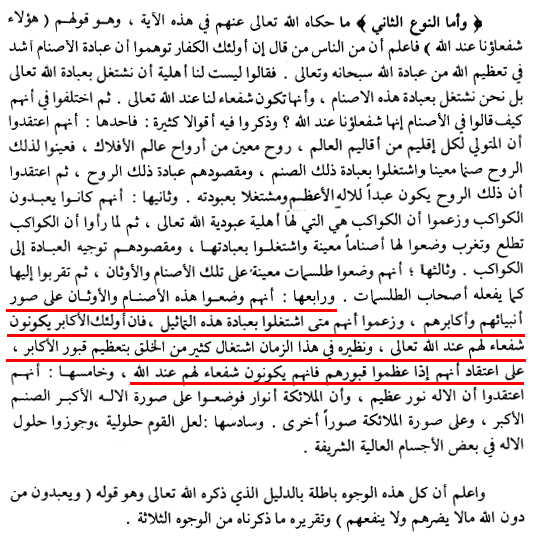| Monday, 17 November 2025 Home • About Us • Contact Us |
 | |
|
|
|
You are here:
Home /
Topics
/
Shafaa'ah
Mail to a Friend • Printer friendly 
Background and Introduction
Historically, the innovations of the first century were light innovations (Khawarij, Shi'ah, Qadariyyah, Murji'ah), in that they did not directly relate to Allaah Himself. Those that came in the second century hijrah were more severe in that they related directly to the belief in Allaah Himself (His Names, Attributes, His Uluww, His Speech), and then from this period the introduction of philosophy and gnosticism (mystical esoteric knowledge) led to further deviations. However, it took around six centuries for shirk (associationism) to spread amongst the Muslims on a wide scale. The seeds of this shirk were spread initially by the Ismaa'eelee Baatiniyyah known as Ikhwan al-Safaa (Brethren of Purity) in the third and fourth centuries, and they were given support by the Ubaidiyyah (Shii'ite rulers of Egypt) when they took power. Prior to this time (before the fifth century, i.e. 400H), whilst the variuos sects had deviations in issues of aqidah, the understanding of Tawhid al-Ibaadah was still relatively firm.
This shows that the greater deviations occurred when the people were further away from the era of revelation, and this is simply a cycle of history. This has always occurred after the sending of Prophets and Messengers, and it is indicated in the Prophetic texts for this ummah, such as those texts that mention that this (Muslim) nation will follow the footsteps of those (nations) that came before them (such as the Jews and Christians). For this reason, the greatest deviation, shirk with Allaah, was the last of the affairs to enter into the Ummah - long after the era of Prophethood.
Coming to the subject of this series of articles now, we present in this some quotations from the Tafseer of ar-Razi pertaining to the core arguments for the justification of supplicating to those besides Allaah and seeking their intercession, and through this we illustrate that this type of refutation against the grave and saint worshippers precedes Ibn Taymiyyah (rahimahullaah) by a century and Ibn Abdul-Wahhaab (rahimahullaah) by six centuries, and it also uncovers the academic and intellectual fraud of today's grave and saint-worshippers against the Scholars of Tawheed.
Fakhr ud-Din ar-Razi on Grave worship and intercession
Fakhr ud-Din ar-Razi (d. 606H) has some commentary upon the saying of Allaah, the Most High, in Surah Yunus, which is a description of the reason used by the pagans to justify their worship of other deities besides Allaah:
 وَيَعْبُدُونَ مِن دُونِ اللّهِ مَا لاَ يَضُرُّهُمْ وَلاَ يَنفَعُهُمْ وَيَقُولُونَ هَـؤُلاء شُفَعَاؤُنَا عِندَ اللّهِ قُلْ أَتُنَبِّئُونَ اللّهَ بِمَا لاَ يَعْلَمُ فِي السَّمَاوَاتِ وَلاَ فِي الأَرْضِ سُبْحَانَهُ وَتَعَالَى عَمَّا يُشْرِكُونَ وَيَعْبُدُونَ مِن دُونِ اللّهِ مَا لاَ يَضُرُّهُمْ وَلاَ يَنفَعُهُمْ وَيَقُولُونَ هَـؤُلاء شُفَعَاؤُنَا عِندَ اللّهِ قُلْ أَتُنَبِّئُونَ اللّهَ بِمَا لاَ يَعْلَمُ فِي السَّمَاوَاتِ وَلاَ فِي الأَرْضِ سُبْحَانَهُ وَتَعَالَى عَمَّا يُشْرِكُونَ 
He says the following (Tafsir ar-Razi 17/63):
In the above passage ar-Razi is speaking about the part of the verse in which Allaah is quoting from those who worship others besides Him, which in reality do not benefit them nor harm them, and they say, "These are our intercessors with Allaah..." So ar-Razi explains that these people argued that they should not be occupied with worshipping Allaah, but that they should be occupied with worshipping these idols because they will intercede for them with Allaah. Then ar-Razi says that these people differed from this point onwards as to particularly how they understood these idols to be intercessors for them, and he says that they mentioned many sayings in this regard. Then he explains six of such explanations and from them:
After mentioning these three, he then says:
And he means by "the senior ones (al-akaabir)" the righteous people. After mentioning another two manifestations, he then finishes by saying:
Between ar-Razi and Today's Saint and Grave-Worshippers Those spoken of by ar-Razi in his time:
ونظيره في هذا الزمان اشتغال كثير من الخلق بتعظيم قبور الأكابر على اعتقاد أنهم إذا عظموا قبورهم فانهم يكونون شفعاء لهم عند الله
They are the same ones present in the time of Shaykh ul-Islam Ibn Taymiyyah and likewise Shaykh ul-Islam Ibn Abdul-Wahhaab, and likewise, those of our time who are attached to the graves, calling upon the deceased, venerating them and the likes, all with the reason that they are hoping to win favor with them and win their intercession. Ar-Razi included this amongst the various manifestations he listed, and then stated that all of these are futile and false on account of the evidence of the verse under discussion. Shaykh ul-Islaam Ibn Taymiyyah on the tawassul of the Mushriks Compare the above saying of ar-Razi:
ونظيره في هذا الزمان اشتغال كثير من الخلق بتعظيم قبور الأكابر على اعتقاد أنهم إذا عظموا قبورهم فانهم يكونون شفعاء لهم عند الله
With what has been said by Shaykh ul-Islaam Ibn Taymiyyah, he has many statements, but this is just a short paragraph from the book "Qaa'idah Jaleelah Fit-Tawassul wal-Waseelah", (tahqeeq Shaykh Rabee' bin Hadee, p. 13):
فالمشركون كانوا يتخذون من دون الله شفعاء من الملائكة والأنبياء والصالحين، ويصورون تماثيلهم فيستشفعون بها ويقولون: هؤلاء خواص الله، فنحن نتوسل إلى الله بدعائهم وعبادتهم ليشفعوا لنا
And he also said (pp. 14-15):
وكذلك قصدوا قبورهم وقالوا: نحن نستشفع بهم بعد مماتهم ليشفعوا لنا إلى الله، وصوروا تماثيلهم فعبدوهم كذلك، وهذه الشفاعة أبطلها الله ورسوله وذم المشركين عليها وكفرهم بها
Whilst noting that ar-Razi is not even talking about statues, he simply mentioned the veneration of the graves as a means of soliciting intercession as one of the six manifestations of the worship of others besides Allaah in the verse he was commenting upon. Shaykh ul-Islaam Ibn Abdul-Wahhaab on the tawassul of the Mushriks Also compare the above saying of ar-Razi:
ونظيره في هذا الزمان اشتغال كثير من الخلق بتعظيم قبور الأكابر على اعتقاد أنهم إذا عظموا قبورهم فانهم يكونون شفعاء لهم عند الله
With what is found in the books of Shaykh ul-Islaam Muhammad bin Abdul-Wahhaab (d. 1175H), and we can just take "Kashf ush-Shubuhaat" as an example, here are some excerpts from it:
أرسله إلى قوم يتعبدون ويحجون ويتصدقون ويذكرون الله كثيراً ولكنهم يجعلون بعض المخلوقات وسائط بينهم وبين الله. يقولون: نريد منهم التقرب إلى الله ، ونريد شفاعتهم عنده؛ مثل الملائكة، وعيسى، ومريم، وأناس غيرهم من الصالحين
وعرفت أن إقرارهم بتوحيد الربوبية لم يدخلهم في الإسلام، وأن قصدهم الملائكة أو الأنبياء، أو الأولياء، يريدون شفاعتهم، والتقرب إلى الله بذلك هو الذي أحل دماءهم وأموالهم، عرفت حينئذٍ التوحيد الذي دعت إليه الرسل، وأبى عن الإقرار به المشركون
فإذا عرفت أن هذا الذي يسميه المشركون في زماننا هذا "الاعتقاد"، هو الشرك الذي أنزل الله في القرآن
All of what Shaykh ul-Islam Ibn Abdul-Wahhaab has mentioned here is the same as what ar-Razi pointed out about many people in his time who turned to veneration of and attachment to the graves, in order to solicit the intercession of those dead people. And what Shaykh ul-Islam Ibn Abdul-Wahhaab referred to as "I'tiqaad" is the precise thing that ar-Razi was alluding to, and it is also given other names by the contemporaries, such as "Walaayah" and more popularly nowadays as "tawassul" (a means of nearness) - and they do not mean the legitimate tawassul but rather they mean veneration of the saints and the graves, just as ar-Razi pointed out over 800 years ago. Closing Note The spurious allegation which often comes from the direction of the Sufis and contemporary Jahmiyyah parading under the name of "Ash'ariyyah" against the people of Tawhid and Sunnah, has been exposed here, with ar-Razi (d. 606H), preceding both Shaykh ul-Islam Ibn Taymiyyah (by a hundred years) and Shaykh ul-Islam Ibn Abdul-Wahhaab (by six hundred years) in showing rejection against the grave-worshippers who seek intercession from the dead.
Link to this article: Show: HTML Link • Full Link • Short Link Related Articles:
You must be registered and logged in to comment. |
|
|
© TawhidFirst.Com. All rights reserved.
|
 To the right is a cover page for the book "Tafsir ar-Razi", also known as "Mafaateeh al-Ghayb" belonging to
To the right is a cover page for the book "Tafsir ar-Razi", also known as "Mafaateeh al-Ghayb" belonging to 
 The first of them: That they believed that the a specific spirit from the spirits of the world of celestial bodies is in control of a particular region from the regions of the world, and thus they designated a specific idol for that spirit, and they occupied themselves with worshipping that idol. And their intent (behind worshipping the idol) was to woship that spirit. Then they also believed that the spirit was a slave of the greatest deity, and was occupied in worshipping it (the greatest deity).
The first of them: That they believed that the a specific spirit from the spirits of the world of celestial bodies is in control of a particular region from the regions of the world, and thus they designated a specific idol for that spirit, and they occupied themselves with worshipping that idol. And their intent (behind worshipping the idol) was to woship that spirit. Then they also believed that the spirit was a slave of the greatest deity, and was occupied in worshipping it (the greatest deity).